Units1-2Revision课件2021-2022学年牛津译林版九年级英语下册(共18张PPT)
文档属性
| 名称 | Units1-2Revision课件2021-2022学年牛津译林版九年级英语下册(共18张PPT) |  | |
| 格式 | pptx | ||
| 文件大小 | 209.3KB | ||
| 资源类型 | 教案 | ||
| 版本资源 | 牛津译林版 | ||
| 科目 | 英语 | ||
| 更新时间 | 2022-04-07 20:55:05 | ||
图片预览

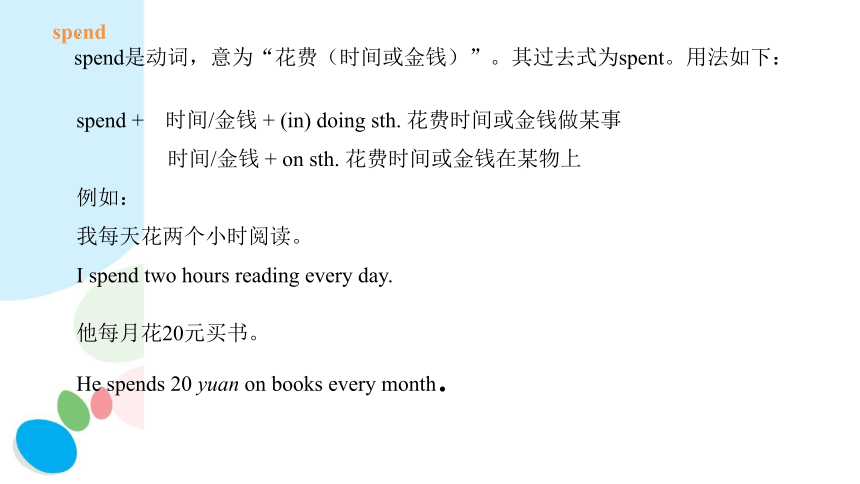
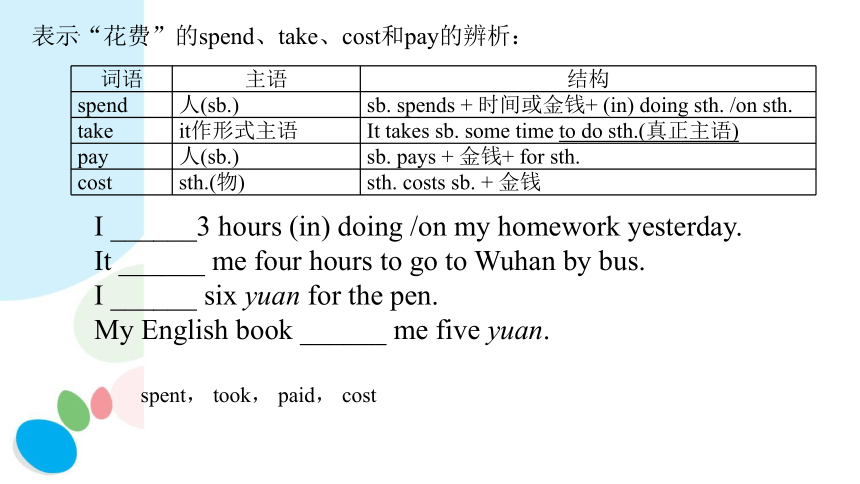
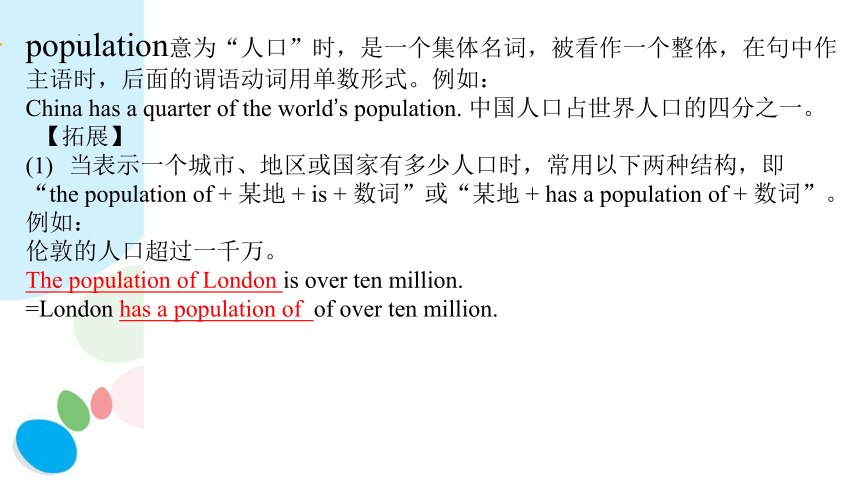
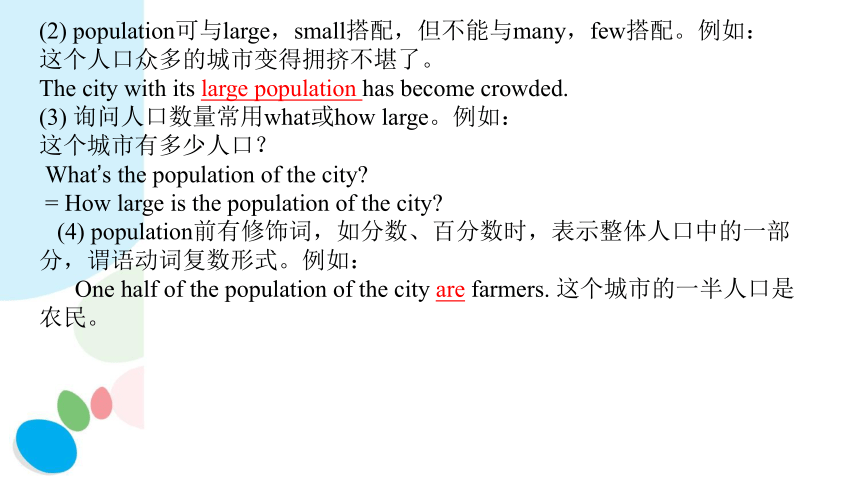
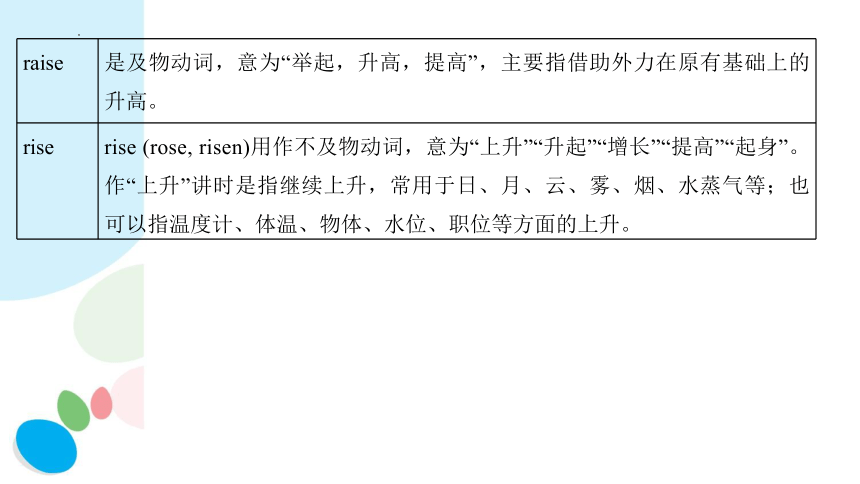
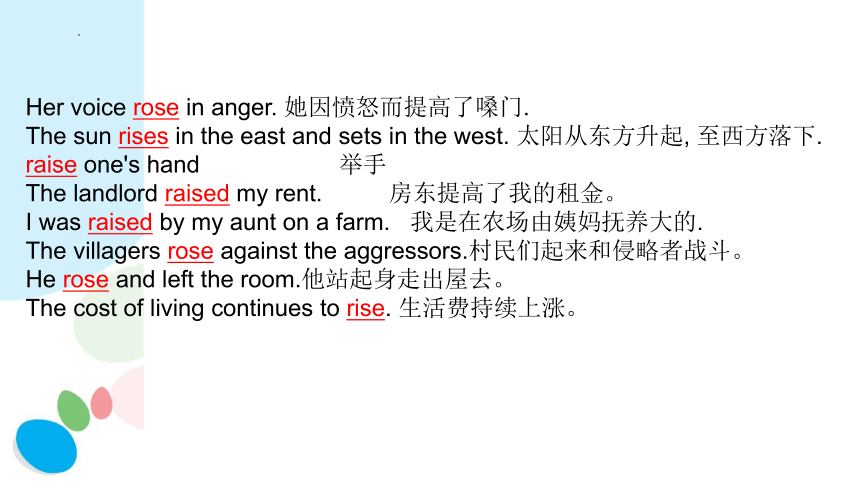
文档简介
(共18张PPT)
9B Unit1-2 知识梳理
spend
spend是动词,意为“花费(时间或金钱)”。其过去式为spent。用法如下:
spend + 时间/金钱 + (in) doing sth. 花费时间或金钱做某事
时间/金钱 + on sth. 花费时间或金钱在某物上
例如:
我每天花两个小时阅读。
I spend two hours reading every day.
他每月花20元买书。
He spends 20 yuan on books every month.
词语 主语 结构
spend 人(sb.) sb. spends + 时间或金钱+ (in) doing sth. /on sth.
take it作形式主语 It takes sb. some time to do sth.(真正主语)
pay 人(sb.) sb. pays + 金钱+ for sth.
cost sth.(物) sth. costs sb. + 金钱
表示“花费”的spend、take、cost和pay的辨析:
I ______3 hours (in) doing /on my homework yesterday.
It ______ me four hours to go to Wuhan by bus.
I ______ six yuan for the pen.
My English book ______ me five yuan.
spent, took, paid, cost
population意为“人口”时,是一个集体名词,被看作一个整体,在句中作主语时,后面的谓语动词用单数形式。例如:
China has a quarter of the world’s population. 中国人口占世界人口的四分之一。
【拓展】
当表示一个城市、地区或国家有多少人口时,常用以下两种结构,即
“the population of + 某地 + is + 数词”或“某地 + has a population of + 数词”。
例如:
伦敦的人口超过一千万。
The population of London is over ten million.
=London has a population of of over ten million.
(2) population可与large,small搭配,但不能与many,few搭配。例如:
这个人口众多的城市变得拥挤不堪了。
The city with its large population has become crowded.
(3) 询问人口数量常用what或how large。例如:
这个城市有多少人口?
What’s the population of the city
= How large is the population of the city
(4) population前有修饰词,如分数、百分数时,表示整体人口中的一部分,谓语动词复数形式。例如:
One half of the population of the city are farmers. 这个城市的一半人口是农民。
raise 是及物动词,意为“举起,升高,提高”,主要指借助外力在原有基础上的升高。
rise rise (rose, risen)用作不及物动词,意为“上升”“升起”“增长”“提高”“起身”。作“上升”讲时是指继续上升,常用于日、月、云、雾、烟、水蒸气等;也可以指温度计、体温、物体、水位、职位等方面的上升。
Her voice rose in anger. 她因愤怒而提高了嗓门.
The sun rises in the east and sets in the west. 太阳从东方升起, 至西方落下.
raise one's hand 举手
The landlord raised my rent. 房东提高了我的租金。
I was raised by my aunt on a farm. 我是在农场由姨妈抚养大的.
The villagers rose against the aggressors.村民们起来和侵略者战斗。
He rose and left the room.他站起身走出屋去。
The cost of living continues to rise. 生活费持续上涨。
be famous for 意为“以/因……著名/出名/闻名”, for表示人或物之所以闻名的原因, 其后常接表示特点、特长的名词。
be famous as 意为“以……(身份)而著名”,as 后接表示职业的名词。
be famous to 意为“对……来说是著名的”,to 后常接人。
be famous for,be famous as,be famous to
巩俐以她的精湛演技而著称。
Gong Li is famous for her fine acting.
齐白石作为画家而闻名于世。
Qi Baishi was famous as an artist in the world.
流行歌手对于那些年轻人来说是著名的。
The pop singer is famous to the young people.
used to do sth. 意为“过去常常做某事”,指过去经常做而现在不做了,是一般过去时。
be used to do sth. 意为“被用来做某事”,相当于 be used for doing sth.,是被动结构。
be used to doing sth. 意为“习惯于做某事”,可用于任何时态,其中的to 是介词,后接名词或动 词-ing形式。
我的爷爷奶奶过去经常在晚饭后散步。
My grandparents used to walk after supper.
小刀是用来切东西的。
Knives are used to cut things.
我爸爸习惯于住在小山村。
My father is used to living in the village.
练习:
(1) Dick _______ in America, but he has been ______ Chinese food since he moved to China.
A. used to live; used to eating B. is used to live; used to eat
C. is used to live;used to eating D. used to living;used to eat
(2) I hear your grandpa has an old cup in your home.
Yes. It _______ drink tea with it long ago and my grandpa ______ drink tea with it when he was young.
A. was used to;was used to B. used for: used to
C. was used for; was used to D. was used for;used to
(3) The Yellow River ______ flood large areas, but now the waters of it are used to _____ energy.
A. was used to;producing B. used to;producing C. was used to; produce D.used to; produce
(4) She used to _______ a bus to school. but now she is used to _____ to school.
A. talking;walk B. take;walk C. taking;walking D. take;walking
(5)他习惯于每天晚饭后散步。
He ________________________________________________________________ every day.
解析:1-4 ADDD 5. is used to taking a walk after dinner
(1) 复习every的含义及用法:(表示发生的频率)每,每逢,每隔,如:
The buses go every 10 minutes.公共汽车每隔10分钟发一班车。
另请注意:对 every短语提问要使用 How often
【注意】固定词组 every other的含义:每隔一个,
如: 他们每隔一个月来看我们一次。
They visit us every other month.
(2) one of the wonders of the world的含义:世界奇迹之一。
练习:
--How often are the Olympic Games held
--_______ four years.
Every B. Each C. In D. For
(2)尼亚加拉瀑布是世界奇景之一。
The Niagara Falls __________________________________________.
解析:A ;is one of the wonders of the world
lie是动词,意为“位于”,相当于be或stand,(lay,lain)。
日本位于中国东面。Japan lies to the east of China.
【拓展】
(1)lie vi. 认躺,平卧,其现在分词形式是 lying,过去式是lay,过去分词是lain。常用结构:lie on... 意为“躺在……上面”。
例:他经常躺在床上看书。
He often lies on bed to read.
(2)lie vt. & vi. 说谎,撒说,(lied,lied);lie作名词,意为“谎言,谎话”,tell a lie 意为“说谎”。
例:Lies can’t cover the facts. 谎言掩盖不了事实。
(3)lay vt.(laid,laid) 放;产(卵),下(蛋)。
例:The hen lays an egg every day.
例1. The factory ______ to the west of town.
例2. The hen______three eggs.
例3. She_______to them about her age in order to get the job.
lies, laid, lied
区分mange to do sth.与try to do sth.
manage to do sth.设法做成某事.强调结果”成功完成”; 而try to do sth.尽力做某事,强调动作,不知道此事能否做成.
How could he manage to get away from the prison. 他怎么设法从监狱里逃走的呢
练习:
(1)Although many great people ever failed, they never gave up and _______ to succeed.
A. managed B. refused C. held D. offered
(2)里奥设法让那个伤心的孩子振作起来。
Leo __________________________________________ the sad child.
解析:1-3 AA managed to cheer up
On 20 July 1969, Armstrong became the first man to walk on the Moon. Together with Buzz Aldrin, he landed the spacecraft Apollo II on the Moon.
短语 the first man to walk on the Moon意为“第一个在月球上漫步的人。”其中的动词不定式用作定语。
练习:
(1) Mr. Zhang, our English teacher, is always the first _____to our class every day.
A. comes B. come C. to come D. coming
(2) 你能告诉我谁是第一个想到这个主意的人呢
Can you tell me ______________________________________________________this idea
解析:1-2 C who is the first man to think of/come up with
present的用法:present vt. 颁发;提交
present sb. with sth.= present sth. to sb. 把交给;颁发;授予。
如: They presented flowers to their teacher.他们把花给老师。
The mayor presented a silver cup to the winner
= The mayor presented the winner with a silver cup.市长把银杯授予了获胜者。
练习:
When Mr Brown left the firm, the director presented a gold watch _____ him.
A. with B. to C. for D. by
(2) 我想知道奖牌什么时候会颁发给获胜者。
I wonder ______________________________________________.
解析:1-2 B when the medal will be presented to the winner
Many modern inventions have made a great difference in our life. They have changed the way we live.
(1) 词组 make a difference to的含义:有作用,有关系,有影响。
【注意】make a difference to的变体: make no(some,etc) difference to没有(有些)作用,关系,影响。
如:这场雨对比赛没多大影响。
The rain didn't make much difference to the game.
转学对我的一生有着重大影响。
Changing schools made a big difference to my life.
(1) Does it make any _______ whether they will win the match or not this afternoon
A. difference B.time C. way D. sense
(2)没有他,会影响你的工作吗 (注: absence的含义为“缺席”)
Will his absence ___________________________________________ your work
解析:1-2 A, make a difference to
Fresh food would go bad in summer in a few hours. In the past, people washed their clothes by hand.
(1) “系表结构” go bad的含义:(食物等)变酸,变坏,变质。
(2) 词组 by hand的含义:①手工的;②亲手交的,非邮递的。
练习:
(1) Some of the apples are bad, but I believe the rest _______ sweet.
A. taste B. tastes C. are tasted D. is tasted
(2) Why don' t you put the meat in the fridge It will ______ fresh for several days.
A. be stayed B. stay C. be staying D. have stayed
(3) The water ______ cool when I jumped into the pool for morning exercises.
A. was felt B. is felt C. felt D. feels
(4)因为天气热,这条鱼已变坏。
The fish ______________________________________________________the hot weather.
(5)在那个年代,书籍是靠手工制作的。
In those days, books were produced _______ _______.
解析:1-4 ABC has gone bad because of 4. by hand
THANK YOU!
9B Unit1-2 知识梳理
spend
spend是动词,意为“花费(时间或金钱)”。其过去式为spent。用法如下:
spend + 时间/金钱 + (in) doing sth. 花费时间或金钱做某事
时间/金钱 + on sth. 花费时间或金钱在某物上
例如:
我每天花两个小时阅读。
I spend two hours reading every day.
他每月花20元买书。
He spends 20 yuan on books every month.
词语 主语 结构
spend 人(sb.) sb. spends + 时间或金钱+ (in) doing sth. /on sth.
take it作形式主语 It takes sb. some time to do sth.(真正主语)
pay 人(sb.) sb. pays + 金钱+ for sth.
cost sth.(物) sth. costs sb. + 金钱
表示“花费”的spend、take、cost和pay的辨析:
I ______3 hours (in) doing /on my homework yesterday.
It ______ me four hours to go to Wuhan by bus.
I ______ six yuan for the pen.
My English book ______ me five yuan.
spent, took, paid, cost
population意为“人口”时,是一个集体名词,被看作一个整体,在句中作主语时,后面的谓语动词用单数形式。例如:
China has a quarter of the world’s population. 中国人口占世界人口的四分之一。
【拓展】
当表示一个城市、地区或国家有多少人口时,常用以下两种结构,即
“the population of + 某地 + is + 数词”或“某地 + has a population of + 数词”。
例如:
伦敦的人口超过一千万。
The population of London is over ten million.
=London has a population of of over ten million.
(2) population可与large,small搭配,但不能与many,few搭配。例如:
这个人口众多的城市变得拥挤不堪了。
The city with its large population has become crowded.
(3) 询问人口数量常用what或how large。例如:
这个城市有多少人口?
What’s the population of the city
= How large is the population of the city
(4) population前有修饰词,如分数、百分数时,表示整体人口中的一部分,谓语动词复数形式。例如:
One half of the population of the city are farmers. 这个城市的一半人口是农民。
raise 是及物动词,意为“举起,升高,提高”,主要指借助外力在原有基础上的升高。
rise rise (rose, risen)用作不及物动词,意为“上升”“升起”“增长”“提高”“起身”。作“上升”讲时是指继续上升,常用于日、月、云、雾、烟、水蒸气等;也可以指温度计、体温、物体、水位、职位等方面的上升。
Her voice rose in anger. 她因愤怒而提高了嗓门.
The sun rises in the east and sets in the west. 太阳从东方升起, 至西方落下.
raise one's hand 举手
The landlord raised my rent. 房东提高了我的租金。
I was raised by my aunt on a farm. 我是在农场由姨妈抚养大的.
The villagers rose against the aggressors.村民们起来和侵略者战斗。
He rose and left the room.他站起身走出屋去。
The cost of living continues to rise. 生活费持续上涨。
be famous for 意为“以/因……著名/出名/闻名”, for表示人或物之所以闻名的原因, 其后常接表示特点、特长的名词。
be famous as 意为“以……(身份)而著名”,as 后接表示职业的名词。
be famous to 意为“对……来说是著名的”,to 后常接人。
be famous for,be famous as,be famous to
巩俐以她的精湛演技而著称。
Gong Li is famous for her fine acting.
齐白石作为画家而闻名于世。
Qi Baishi was famous as an artist in the world.
流行歌手对于那些年轻人来说是著名的。
The pop singer is famous to the young people.
used to do sth. 意为“过去常常做某事”,指过去经常做而现在不做了,是一般过去时。
be used to do sth. 意为“被用来做某事”,相当于 be used for doing sth.,是被动结构。
be used to doing sth. 意为“习惯于做某事”,可用于任何时态,其中的to 是介词,后接名词或动 词-ing形式。
我的爷爷奶奶过去经常在晚饭后散步。
My grandparents used to walk after supper.
小刀是用来切东西的。
Knives are used to cut things.
我爸爸习惯于住在小山村。
My father is used to living in the village.
练习:
(1) Dick _______ in America, but he has been ______ Chinese food since he moved to China.
A. used to live; used to eating B. is used to live; used to eat
C. is used to live;used to eating D. used to living;used to eat
(2) I hear your grandpa has an old cup in your home.
Yes. It _______ drink tea with it long ago and my grandpa ______ drink tea with it when he was young.
A. was used to;was used to B. used for: used to
C. was used for; was used to D. was used for;used to
(3) The Yellow River ______ flood large areas, but now the waters of it are used to _____ energy.
A. was used to;producing B. used to;producing C. was used to; produce D.used to; produce
(4) She used to _______ a bus to school. but now she is used to _____ to school.
A. talking;walk B. take;walk C. taking;walking D. take;walking
(5)他习惯于每天晚饭后散步。
He ________________________________________________________________ every day.
解析:1-4 ADDD 5. is used to taking a walk after dinner
(1) 复习every的含义及用法:(表示发生的频率)每,每逢,每隔,如:
The buses go every 10 minutes.公共汽车每隔10分钟发一班车。
另请注意:对 every短语提问要使用 How often
【注意】固定词组 every other的含义:每隔一个,
如: 他们每隔一个月来看我们一次。
They visit us every other month.
(2) one of the wonders of the world的含义:世界奇迹之一。
练习:
--How often are the Olympic Games held
--_______ four years.
Every B. Each C. In D. For
(2)尼亚加拉瀑布是世界奇景之一。
The Niagara Falls __________________________________________.
解析:A ;is one of the wonders of the world
lie是动词,意为“位于”,相当于be或stand,(lay,lain)。
日本位于中国东面。Japan lies to the east of China.
【拓展】
(1)lie vi. 认躺,平卧,其现在分词形式是 lying,过去式是lay,过去分词是lain。常用结构:lie on... 意为“躺在……上面”。
例:他经常躺在床上看书。
He often lies on bed to read.
(2)lie vt. & vi. 说谎,撒说,(lied,lied);lie作名词,意为“谎言,谎话”,tell a lie 意为“说谎”。
例:Lies can’t cover the facts. 谎言掩盖不了事实。
(3)lay vt.(laid,laid) 放;产(卵),下(蛋)。
例:The hen lays an egg every day.
例1. The factory ______ to the west of town.
例2. The hen______three eggs.
例3. She_______to them about her age in order to get the job.
lies, laid, lied
区分mange to do sth.与try to do sth.
manage to do sth.设法做成某事.强调结果”成功完成”; 而try to do sth.尽力做某事,强调动作,不知道此事能否做成.
How could he manage to get away from the prison. 他怎么设法从监狱里逃走的呢
练习:
(1)Although many great people ever failed, they never gave up and _______ to succeed.
A. managed B. refused C. held D. offered
(2)里奥设法让那个伤心的孩子振作起来。
Leo __________________________________________ the sad child.
解析:1-3 AA managed to cheer up
On 20 July 1969, Armstrong became the first man to walk on the Moon. Together with Buzz Aldrin, he landed the spacecraft Apollo II on the Moon.
短语 the first man to walk on the Moon意为“第一个在月球上漫步的人。”其中的动词不定式用作定语。
练习:
(1) Mr. Zhang, our English teacher, is always the first _____to our class every day.
A. comes B. come C. to come D. coming
(2) 你能告诉我谁是第一个想到这个主意的人呢
Can you tell me ______________________________________________________this idea
解析:1-2 C who is the first man to think of/come up with
present的用法:present vt. 颁发;提交
present sb. with sth.= present sth. to sb. 把交给;颁发;授予。
如: They presented flowers to their teacher.他们把花给老师。
The mayor presented a silver cup to the winner
= The mayor presented the winner with a silver cup.市长把银杯授予了获胜者。
练习:
When Mr Brown left the firm, the director presented a gold watch _____ him.
A. with B. to C. for D. by
(2) 我想知道奖牌什么时候会颁发给获胜者。
I wonder ______________________________________________.
解析:1-2 B when the medal will be presented to the winner
Many modern inventions have made a great difference in our life. They have changed the way we live.
(1) 词组 make a difference to的含义:有作用,有关系,有影响。
【注意】make a difference to的变体: make no(some,etc) difference to没有(有些)作用,关系,影响。
如:这场雨对比赛没多大影响。
The rain didn't make much difference to the game.
转学对我的一生有着重大影响。
Changing schools made a big difference to my life.
(1) Does it make any _______ whether they will win the match or not this afternoon
A. difference B.time C. way D. sense
(2)没有他,会影响你的工作吗 (注: absence的含义为“缺席”)
Will his absence ___________________________________________ your work
解析:1-2 A, make a difference to
Fresh food would go bad in summer in a few hours. In the past, people washed their clothes by hand.
(1) “系表结构” go bad的含义:(食物等)变酸,变坏,变质。
(2) 词组 by hand的含义:①手工的;②亲手交的,非邮递的。
练习:
(1) Some of the apples are bad, but I believe the rest _______ sweet.
A. taste B. tastes C. are tasted D. is tasted
(2) Why don' t you put the meat in the fridge It will ______ fresh for several days.
A. be stayed B. stay C. be staying D. have stayed
(3) The water ______ cool when I jumped into the pool for morning exercises.
A. was felt B. is felt C. felt D. feels
(4)因为天气热,这条鱼已变坏。
The fish ______________________________________________________the hot weather.
(5)在那个年代,书籍是靠手工制作的。
In those days, books were produced _______ _______.
解析:1-4 ABC has gone bad because of 4. by hand
THANK YOU!
